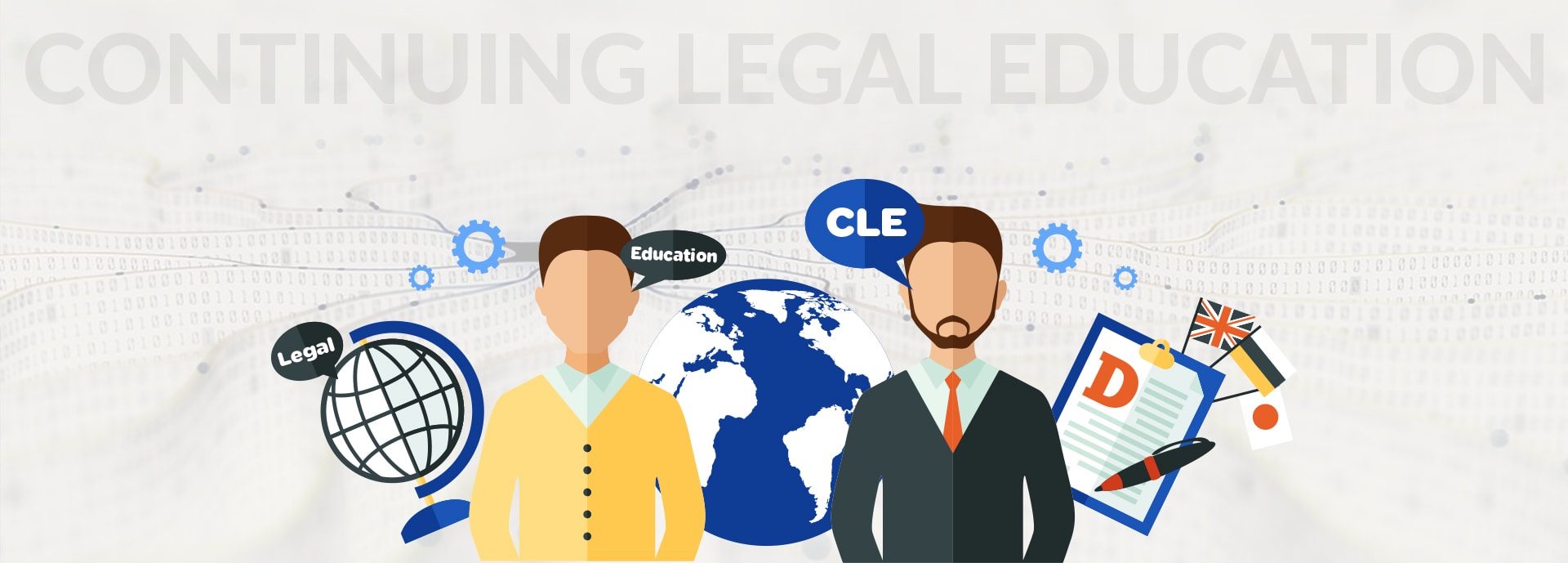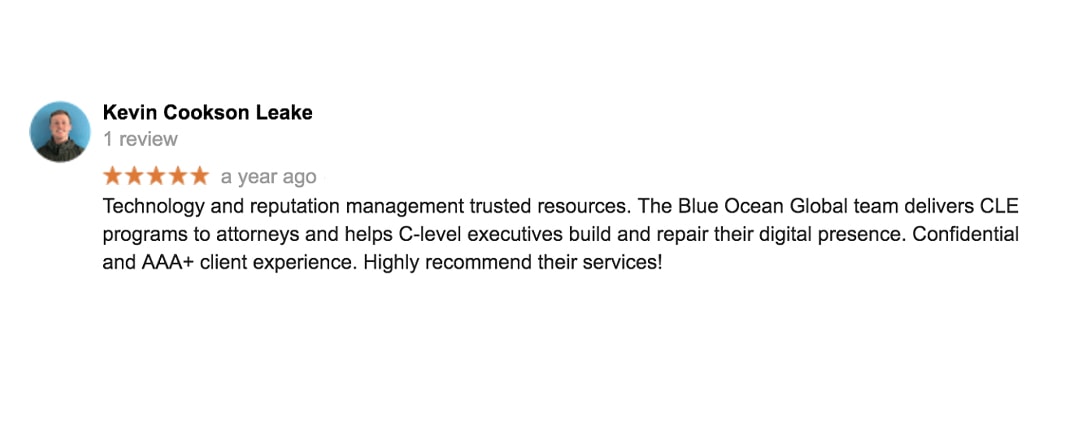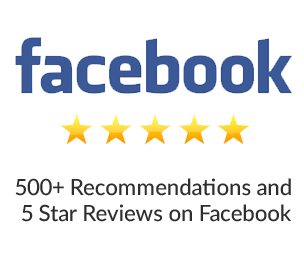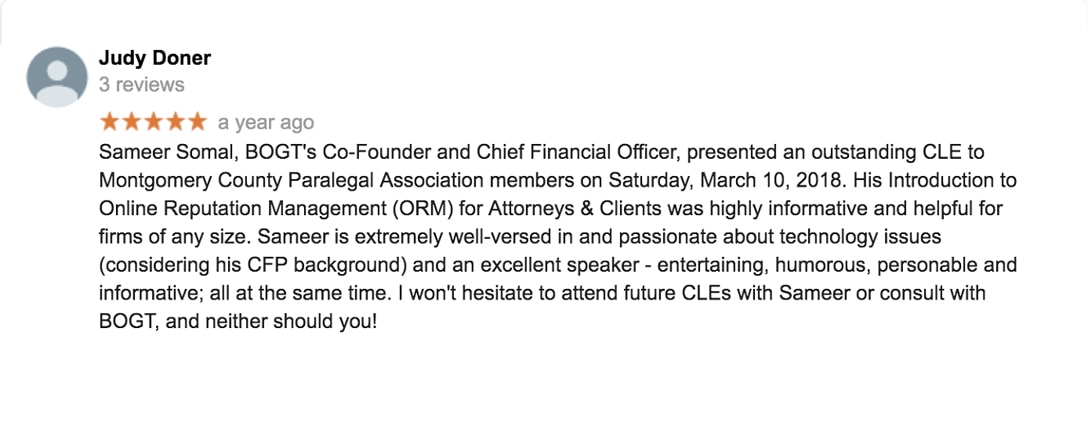A positive reputation is a valuable asset. You deserve to be in control of what the internet says about you or your brand. We specialize in building, monitoring, and protecting digital reputations. Schedule time with our team to audit your existing digital presence and find ways to elevate and enhance your online impression.

Continuing Legal Education (CLE)
Presentation 1: Introduction to Online Reputation Management (ORM) For Attorneys & Clients
Description:
By its very definition, reputation is an intangible and complex concept because it is comprised of impressions, emotions and perceptions. All organizations, including law firms, achieve results from their reputation. The internet has empowered the consumer and revolutionized how information that was once printed in newspapers or shared on the nightly evening news can be created by anyone and accessed from a device that fits comfortably in the palm of our hand. Individual and firm success are now directly correlated with how and what is communicated online.
When promoted effectively online, digital marketing helps businesses accelerate their growth. With choice overload and an expansive new group of online communication platforms, social media adds a new wavelength of opportunity and liability for attorneys. New platforms such as LegalZoom or RocketLawyer offer simplicity, efficiency and scale. In the wake of new competitors and our collective dependence on the internet, digital communication has quickly become the foundation for survival and sustainable growth.
- Understand the importance of Online Reputation Management (ORM)
- Learn the ramifications of you are what you are online. (Google Test)
- Provide an overview of the ORM lifecycle: building, repairing and monitoring.
- Discuss the importance of high quality content, keyword density, cross linking, and domain authority when building digital assets.
- Review the 10 practical tips for successfully managing your online reputation.

Presentation 2: Advanced Online Reputation Management (ORM) For Attorneys & Clients
Description:
Our individual ability to build new relationships, foster trust, and earn respect all contributes to building a reputation. Every day there are 5.5 billion searches performed for a plethora of reasons, including finding a restaurant in a new city, buying mom a gift, or researching the next law firm to engage. The world is literally at our fingertips, but most people only bother to go through detailed information on first page of Google. In fact, 94% of people only look at the first page of Google search results. The general public, including experts and bloggers, can express inaccurate opinions. Their views can then be shared and amplified through a labyrinth of social media channels. The proliferation of performance and peer review websites such as Avvo, Martindale-Hubbell and Yelp also leaves the average attorney more vulnerable than ever before.
In the age of digital Darwinism, we are now guilty until proven innocent. Internet Defamation lawsuits are on the rise. And even when we are innocent, we still may be guilty online. If negative results appear for an attorney or client, their online reputation can quickly damage their offline reputation — and affect their life.
- A client is exonerated and found not guilty of all criminal charges, but when the client or his/her company is Googled, news articles appear highlighting the now dismissed accusations.
- A partner is accused of harassment from a disgruntled ex-employee. When any prospective or current clients Google the firm, defamatory content appears on page 1 of search results and may adversely affects the reputation of each attorney.
Two examples:
The exact nature of reputation issues varies considerably. Assessing reputation damage is not a perfect science. For many companies, Online Reputation Management, SEO, and negative link suppression are synonymous.
- Provide online reputation management guidelines for lawyers, their firms, and their clients.
- Highlight the difference between suppression and removal of defamatory content.
- Provide an overview of the ORM lifecycle: building, repairing and monitoring.
- Review The US Digital Millennium Copyright Act and options for content removal & suppression.
- Share best practices for responding to negative online comments and reviews.
- Review of Internet Defamation & reputation management cases resulting from court case filings, negative news editorials, embarrassing images & videos, negative customer reviews, employee slander, erroneous information and mistaken identity.
Learning objectives:
Presentation 3: 10 Practical Tips for Successfully Managing Online Reputations
Search engines employ complicated algorithms. Hundreds of calculations and contributing factors determine what information populates a search engine results page. Many experts agree that Google’s algorithm often favors negative press and even mugshots. How can law firms and attorneys manage unfair search results and suppress, or even expunge, them from Google? Negative information circulating on the internet can harm businesses and ruin personal lives. Law firms lose contracts, lawyers lose jobs, and most importantly, reputations can be damaged. But the damage doesn’t have to be permanent. In this program, attendees will learn:
- How to build, repair and monitor online reputation management (ORM).
- The importance of high quality content, keyword density, cross linking, and domain authority when building digital assets.
- The difference between search suppression and expungement of defamatory content.
- Discuss the importance of high quality content, keyword density, cross linking, and domain authority when building digital assets.

Presentation 4: Digital Reputation 101: Relationships, Client Experience & Success
The Digital Revolution revolutionizes our access to knowledge. Information that was once printed in newspapers or shared on the nightly evening news can be created by anyone and accessed from a device that fits comfortably in the palm of their hand. The internet has empowered legal marketers and evolved the law firm client experience. If we don’t like change, we will like irrelevance even less.
An attorney’s opportunity set is now directly correlated with how and what is communicated online. The world and the “Google Test” are literally at our fingertips. Online, you are guilty until proven innocent. Success now depends more on what is said (and not said) on the internet. Online communication is not just a part of an individual’s or law firm’s reputation, it has become the foundation and most critical component for its survival and growth.
We sometimes overlook or undervalue the importance of what we can only measure qualitatively, including reputation. Success in life is a function of our interpersonal relationships. How does one quantify trust, communication, and emotional intelligence?

- Understand the importance of Online Reputation Management (ORM).
- Provide an overview of the ORM lifecycle: building, repairing and monitoring.
- Review proven strategies for building relationships.
- Discuss the importance of high quality content, keyword density, cross linking, and domain authority when building digital assets.
- Implement techniques for using social media to support your business and attract new clients.
- Highlight the difference between suppression and removal of defamatory content.
Learning objectives include:




We provide access to our resources, intellectual capital, and global networks.
Schedule a 30 minute phone or video conversation with us to learn more about engaging expert Continuing Legal Education Services.






